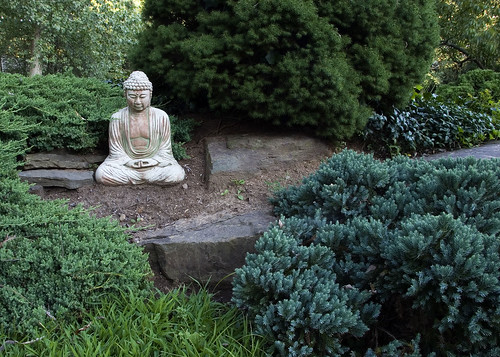
TheGardenLady received this question from Tonia:
I was wondering if you could give me some names of some flowers and plants that would do well in shade to partial sun. We are renovating a meditation garden at the assisted living center where I work and need to put in some things that will survive in such an area. Also the names of some good berry-bearing plants or shrubs that the turtles in the garden could eat from.
How lovely to renovate and by so doing create a new meditation garden in an assisted living center. What a wonderful assignment. My favorite meditation garden was in Encinitas, California.
As requested, I will be giving you some suggestions for plants that are easy care and that I think will look lovely in a mediation garden.
But to create any kind of garden, a little more information about the site is always helpful. More information is needed both for yourself as well as the person who is being asked for advice.
Since this is a garden that has “shade to partial sun,” are trees providing the shade? How large are the trees? You want to know what kind of root mass you are working with as well as how much shade is given off. Are they deciduous or evergreen trees that are giving the partial shade? Certain trees give more shade than others. For example, if there is a Norway Maple, chop it down because the leaves will block anything from growing under them as the tree ages and its root mass will not allow much to grow. Or does a building provide the shade? Buildings have different problems for plants. Is it morning sun or afternoon sun? Most flowering plants want 5 to 6 hours of sun. Green plants don’t need much sun. The morning sun is cooler than the afternoon sun. Certain plants prefer cooler or hotter locations. Is it dry in the shade or is it moist? Different types of plants have differing moisture requirements. (See here) In fact, landscapers even want to know where the N-S-E-W designations are. Different plants prefer different positions. And of course, one needs the planting zone to get plant recommendations.
Then you should ask yourself what type of plants do you prefer? Do you like native plants? Do you prefer annuals or perennials or do you like a mixture? Do you prefer easy care perennials with shorter bloom periods but with less maintenance or annuals that bloom all summer? The more information one has, the better one can advise.
Photos of meditation gardens can be found here.
In the second part of the series on meditation gardens, published in two days, TheGardenLady will discuss the idea of using hostas when creating a meditation garden.
